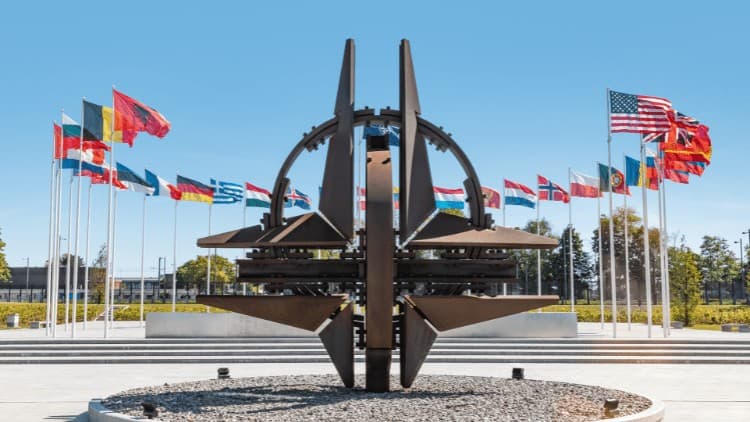A world at peace depends on making knowledge which could be of military as well as commercial value a public good.

Reform of global institutions such as the World Trade Organization is necessary not only to overcome inequalities, excessive financialisation and ‘secular stagnation’. It is also needed to favour military and economic disarmament.
I have previously argued that the WTO should introduce a compulsory minimum for investment in open science by each participating state, to prevent the unfair competition of freeriding on open-access knowledge production. There should also be an international authority to decide when the blocking power of monopoly is damaging the world economy.
Such institutional changes are required too as a form of beneficial mutual disarmament. Unilateral military advantages due to military secrets and ‘secret patents’ destabilise peaceful coexistence. Reducing the risk of conflict requires international institutions that foster open science and open markets, placing less knowledge at the services of monopolies and military supremacy and more at the service of all.
Military research and military secrecy may seem incompatible with the ‘intellectual-property rights’ the WTO upholds, which require disclosure of the contents of inventions as a condition for the attribution of intellectual monopoly. Their synergies have however been a key ingredient of globalisation, as well as an important reason for its crisis.
Intellectual monopoly
A complete integration of knowledge into capital has taken place only recently. Thanks to the WTO and its 1994 agreement on aspects of trade-related intellectual-property rights (TRIPS), intellectual monopolies have acquired global protection by virtue of the sanctions guaranteed by an international body. In so doing, exercise of intellectual monopoly has been redefined as a right of universal validity.
The notion of intellectual-property rights appears to mimic physical property rights to land or machinery.There is however a fundamental difference. Whereas rights to land and machines do not prevent others from using identical pieces of land and machines (though obviously not the same ones), intellectual-property rights do so when it comes to knowledge, blocking many valuable investment opportunities.
The reinforcement of private monopoly rights would however also seem to conflict with the need for nation-states to keep military-relevant innovations secret. The patent system is based on disclosure of the innovation and on exclusivity of the right to its use. Both run counter to the requirements of military security: disclosure can facilitate the access of ‘enemies’ to ‘sensitive’ knowledge and technologies; exclusivity can make military equipment dependent on a single private (perhaps ‘foreign’) company.
‘Secret patent’
In spite of the possible conflict between military secrecy and the commercial exploitation of inventions, some countries have tried to exploit their synergies by creating a ‘secret patent’. This would seem an oxymoron, because with a patent the inventor is granted monopoly on use of the innovation in exchange for its disclosure. Without publicity as to the contents of the innovation, others may waste resources to achieve the same result.
A first step towards secret patents came in the United States in 1951 with the Invention Secrecy Act. This prevented the disclosure of inventions and new technologies which, in the opinion of selected federal agencies, could endanger ‘national security’. Award of the patent was then refused but the application kept on file for annual re-evaluation, in case the perceived danger to national security would be eliminated. The provisions of the act were extended to all members of the North Atlantic Treaty Organization with the Paris agreement of September 1960.
NATO’s role in the dissemination and secrecy of military-related innovations has become increasingly important since its members signed the Agreement on Communication of Technical Information for Defense Purposes in October 1970. This protects proprietary information against unauthorised disclosure of technologies by the holders of a production licence. ‘Semi-secret’ patents can therefore circulate among NATO members.
Important implication
If private inventions can become (semi-)secret for military security, secret military research can also generate private patents—the latter being an important implication of the US Bayh-Dole Act of 1980. Previously, public (including military) and private research were not systematically connected. It was believed that government should not grant exclusive licences by generating private monopolies; rather, it should contribute to an open economy with competitive markets.
The Bayh-Dole Act authorised federal agencies to grant individuals exclusive licences on federally owned inventions. Furthermore, it gave the monopoly on federally funded inventions to companies or other organisations (such as universities) which had participated in the research.
Companies which can take part in the two-way flow between military secrets and intellectual monopolies enjoy great advantages. Their innovations may for some time be subject to near-secret patents unknown to their competitors. Research can initially be protected and financed as a military secret and then become a private intellectual monopoly—even when it has been largely subsidised by public agencies.
Hierarchical globalisation
Military secrets and intellectual monopolies have created a very hierarchical globalisation. The US and other NATO members have been able to grant or deny intellectual-monopoly rights to other countries, through the mixing of military and commercial research or through WTO and unilateral sanctions. The system showed all its inefficiency and inequity when the WTO failed to find a qualified majority to suspend vaccine patents during the pandemic, despite this procedure being provided for by the TRIPS agreement.
The crisis of the hierarchical structure of globalisation is due to the fact that other countries, mainly China, have created an alternative system of intellectual monopoly and military secrecy to that of NATO and its associates. This has caused growing commercial and military tensions, which can only be overcome by favouring open science and open markets with appropriate reforms of international institutions.
Setting limits on intellectual-monopoly capitalism and military secrecy should be the challenge of our times. Open science is important not only for economic development but also for creating the conditions for international co-operation and peaceful coexistence among nations.
Ugo Pagano teaches economics at the University of Siena. He is a director of the Associazione Marcello De Cecco and a member of the scientific committee of Fondazione Bassoand of Disuguaglianze e Diversità, which counters inequalities including those due to knowledge privatisation.

